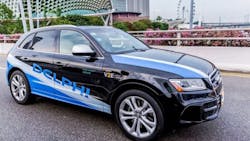Delphi to Begin Testing On-Demand Robot Taxis in Singapore
Delphi Automotive Plc, the vehicle-electronics supplier that last year conducted the first coast-to-coast U.S. demonstration of a self-driving car, will begin testing autonomous autos in Singapore this year that may lead to robot taxis by the end of the decade.
The test will involve six autonomous autos, starting with the modified Audi Q5 the supplier used last year to travel from San Francisco to New York in self-driving mode. In Singapore, the cars initially will follow three predetermined routes and by 2019 will range freely based on customer requests, without a driver or a human minder, according to Glen DeVos, a Delphi senior vice president.
“We actually will have point-to-point automated mobility on demand with no driver in the car,” he said at a briefing with reporters at Delphi’s Troy, Mich. operations base. “It’s one of the first, if not the very first, pilot programs where we’ll demonstrate mobility-on-demand systems.”
Singapore’s Land Transport Authority chose Delphi for the test as the city, like congested urban areas globally, looks to driverless vehicles to address growing gridlock. It asked Delphi to provide robot rides to get commuters to mass-transit stations so fewer cabs will be clogging the roads, DeVos said.
Automakers are pouring money into developing autonomous cars as more than 9 billion people are expected to move to megacities over the next 25 years. Self-driving cars moving in harmony are expected to eventually ease congestion and make roads safer.
“Singapore is a small island and right now for the individual to get to the mass-transit systems, it’s not easy,” DeVos said. As a technology hub, the city is “really trying to lead the world in addressing urban congestion.”
Delphi plans to announce similar pilot programs in the U.S. and Europe later this year, DeVos said.
On the Singapore project, Delphi will work with several technology partners, which he declined to name. For its cross-country demonstration last year, Delphi used high-speed computing technology from Ottomatika Inc. and Nvidia Corp., as well as cameras from Mobileye NV, to help the vehicle quickly make complex decisions, such as timing a highway merge or calculating the safest way around a slow-moving vehicle.
Eliminating Drivers
Besides providing the driverless vehicles, Delphi will develop software that lets commuters call them. Initially, the cars will travel at slow speeds along predetermined loops of about 3.5 miles, with a human driver ready to take the wheel if needed, DeVos said.
In 2018, Delphi will begin running tests without the driver, which will lead to removing the human minder entirely by 2019, he said.
“The no-driver scenario won’t be open to the general public,” DeVos said of the 2019 testing. “It will be for a controlled group of people.”
If all goes as planned, the next phase will be deploying fully autonomous cars without steering wheels for commuters to hail by 2022, he said.
By Keith Naughton
About the Author
Bloomberg
Licensed content from Bloomberg, copyright 2016.
